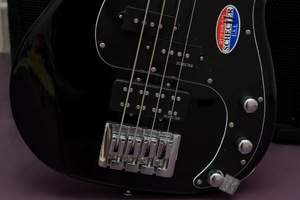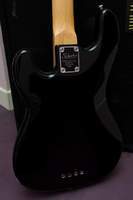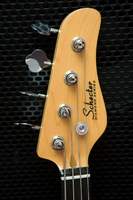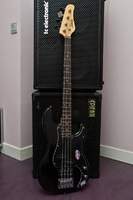Following the Schecter Ultra Bass review published last summer, here we have a brand new product from the Asian manufacturer.
Coming directly from South Korea (read the history of the brand in the previous review), the Diamond P custom IV is a variation of the Precision Bass concept based on two dual-coil pickups. After some bizarre experiments, the manufacturer adds a standard bass guitar to its product catalog.
Classic Piece
Many manufacturers add products inspired by Leo Fender to their product portfolio. You can find lots of Jazz Bass and Precision Bass copies on the market right now. I won’t discuss that, because every market segment has its own classic pieces. For example, nobody would blame violin manufacturers for flagrantly counterfeiting Giovan Giacobo della Corna’s or Zanetto Micheli’s work. The same applies to the bass guitar market. Geniuses are as influent in art as they are in the industry. The thing that interests people like me — musicians who love their creative tool — is the reinterpretation of classic instruments, considering that all manufacturers try to give a personal touch to the “standard” bass guitars, either in the body shape or the pickups, thus trying to differentiate it from the original masterpiece. Why? Because genius can be reinterpreted. More or less successfully.
So, what about this Diamond P, which is, as its name suggests, a variation of the Precision Bass? Our first impression is that the manufacturer doesn’t really invent anything but rather mixes everything. And we don’t mean that in a negative way — a good synthesis is better than a bad invention! But it’s important to say things as they are: the Diamond P takes the neck and the body of a standard Precision Bass. The pickups combination is the same as on the former Precision Deluxe US (equipped with a dual JazzBass pickup originally conceived for Roscoe Beck’s Signature bass). It is precisely the presence of this kind of humbucker that made me want to review this four-string bass guitar. That’s because the Precision Bass I’ve been playing for 11 years has the same humbucker. I like this pickup for its consistency and its powerful sound when I play finger picking style. So I’m curious to see how another manufacturer makes use of this pickup configuration (dual Precision plus dual Jazz Bass), especially on a low priced instrument.
Fender went half way with the Mexican Big Block which had a Precision humbucker in the middle position. But it lacked its counterpart on the bridge. Enter Diamond P with humbuckers in center and bridge positions.
The bolt-on neck (four screws) has almost the same dimensions as the original: 42 mm @ nut, 57 mm @ 12th fret and 34" scale. The fingerboard has the same length and width as the original, a modern C-profile and one more fret (21 frets) than the American Standard Precision Bass. Featuring an Indian rosewood fingerboard, the neck is easy to play but not quite that comfortable for small hands. The white nut is made out of plastic… nothing to brag about. Quite the contrary.
Although the instrument is new, I noticed some white marks around the G string, which goes to show that the nut material is too soft. A first drawback indeed. The solid Grover Vintage tuners are reassuring — they are the standard machine heads for this kind of instrument.
The alder body has a black glossy finish. It is also available in white (Vintage White) and blue metallic (Dark Metalic Blue). It’s true that black is beautiful, but watch out for finger marks, especially if you’ve had a greasy meal! A black pickguard is screwed onto the body. The bridge allows the user to choose two different stringings: either the traditional “top load” or the more modern thru-body. This way, you can emphasize either attack or sustain depending on your taste and needs. The massive bridge has an irreproachable manufacturing quality and seems to be better than the bridge on the original American Fender bass guitars. The strings on the instrument are medium D’Addario, probably a 45–105 set.
The passive electronics for the two pickups offer two volume controls and one tone control. The latter is a push-pull pot that allows you to split the bridge pickup. The instrument uses Schecter pickups: one dual Precision and one dual JazzBass with ceramic magnets. The overall finish of the instrument is good.
For the review I connected the bass guitar directly into my Novation audio interface. I apologize for my rather poor playing: I twisted my wrist during Christmas holidays. (I might have had too much booze…)
Massive Passive
Humbucker pickups are expected to produce a massive sound. And that’s exactly the case. The instrument sounds powerful even though it has no integrated preamp. By the way, what about overall ergonomics? It can be described with a single short sentence: it’s a Precision Bass! You get exactly the PB feel, either standing or sitting.
Let’s come back to the sound. I recorded six bass lines to show all possible variations using the different pickup combinations. First of all, in spite of the passive electronics, the three controls provide many sound variations combining the fatness of the middle pickup and the cutting edge of bridge pickup. The passive sound is very pleasant and ensures a direct and natural tone. The second advantage, especially for bass players who spend a lot of time in the studio behind a mixer, is that this passive system has a very good shielding. Both humbuckers are perfectly quiet, which is very important for the musician and the sound engineer in studio environments.
But I expected a bit more from the pickups: I find they have enough gain but not enough personality. Instead of ceramic, I would have preferred alnico magnets. But that’s a matter of taste… And it’s true that many manufacturers offer good-sounding ceramic pickups, but it’s not my favorite alloy. However, when I listen to the sound samples I recorded, I must admit that the tone and the grit of these pickups is quite convincing.
The Precision pickup does a good job across the full frequency range. It sounds deep on low notes and consistent on high notes. It ensures a good and fat classic sound. The bridge pickup is a good extension to add different sound variations. The split function (just pull the tone control) allows you to use it as a single-coil pickup, thus adding more versatility. In which case, you get a full sound with more brightness, closer to the original JazzBass tone. It also offers more sound variations when combined with the Precision pickup.
The sound color of the bridge pickup emphasizes low mids: it has a biting character but also a slight lack of brightness when used as a humbucker. To get more brilliance, you’ll have to use it as a single-coil, even if the fullness and the power of the response decreases a bit. You’ll have to choose between brightness and fullness. I find this pickup is very interesting in its category: it sounds almost as biting as a Music Man pickup but it is much more versatile.
For the recordings, I had some difficulties adding accents to my playing because this bass guitar has some level peaks on certain notes on the neck. The reason is that the pickups are set a bit too high. I don’t hit the strings that hard, but I like to be able to add nuances to my playing, which is very important for musical expression. That’s why I set the pickups a bit lower using a screwdriver. I almost succeeded but I couldn’t really solve the problem. Thus, I would recommend you to choose a heavier string set and to replace the screws so that you can lower the pickups a bit more without having to damage the screw heads. I find the original screws are a bit too long.
However, the bass is quite pleasant to play and listen. The Diamond P Custom IV offers a good manufacturing quality and a versatile sound range. The sound color is good enough for many music styles, but it didn’t blow me away. The instrument has a slight lack of personality — perhaps I expected too much from it. As time goes by, I become more demanding.

- Micro grave, tonalite milieu00:28
- Micro aigu, tonalite milieu00:34
- Micro aigu, tonalite milieu, switch simple00:34
- Slap, 2 micros, tonalite max00:22
- Slap, 2 micros, tonalite max, switch simple00:22
- Mediator, 2 micros, tonalite max00:26
Conclusion
Talking money, you can get this Schecter for $499 in stores. The price is adequate for a passive bass guitar with bolt-on neck and two dual-coil pickups made in Korea (products coming from Incheon offer a good manufacturing quality) and sold in a cardboard box. This Schecter can be very interesting for a wide range of bass players.





